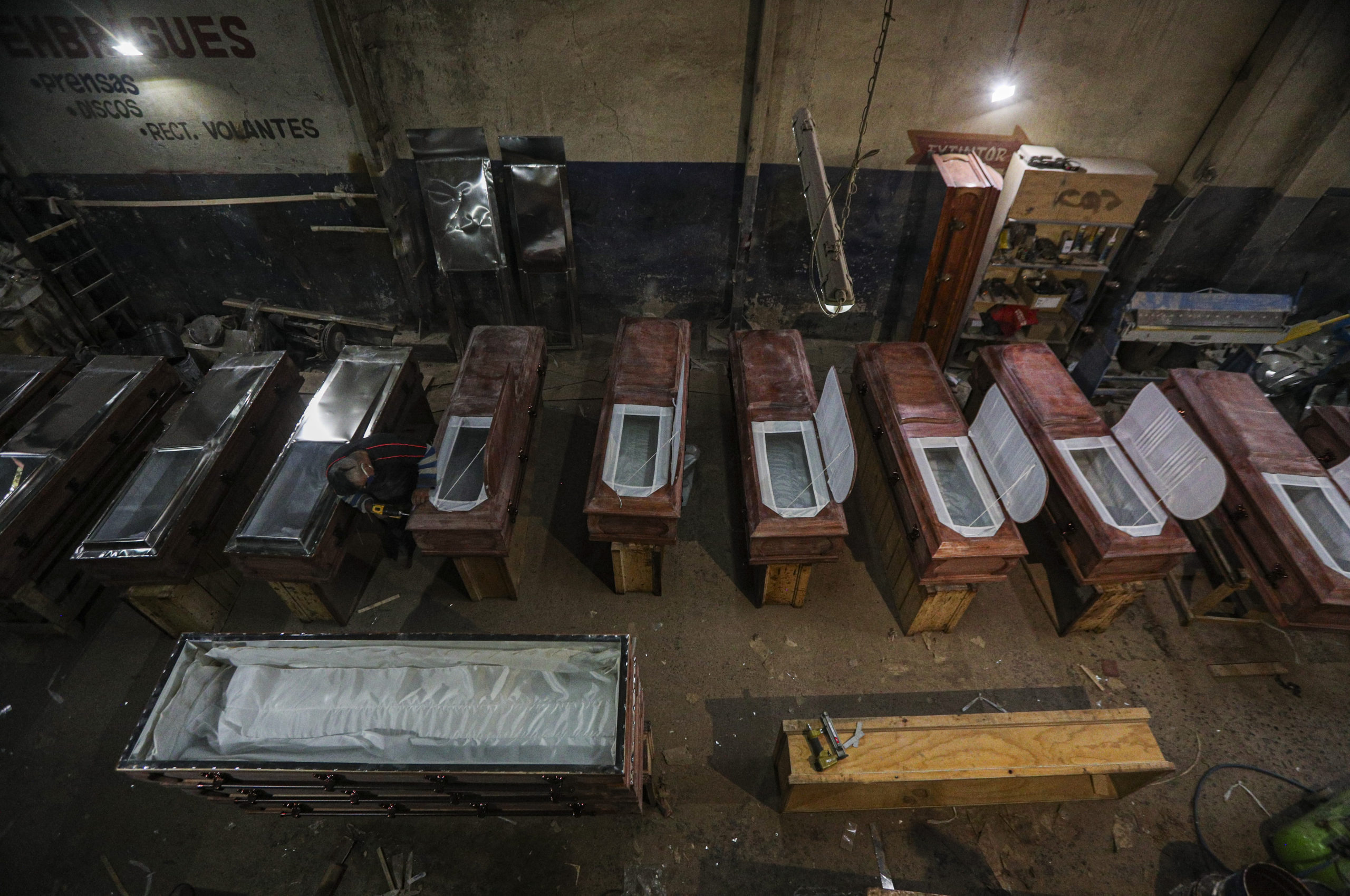Chileans mass-produce caskets to deal with COVID onslaught

Peruvian migrant coffin maker Cesar Ambrosio finishes the details on a production line of coffins at the Bergut Funeral Services in Santiago, Chile, Thursday, June 18, 2020. The coffin production has had to increase up to 120%, according to Nicolas Bergerie, owner of the factory. His more basic coffin model is called the COVID model and is made to cope with the increase of deaths during the coronavirus pandemic. (AP Photo/Esteban Felix)
SANTIAGO, Chile — Nicolás Bergerie’s family has been making caskets for four generations, with barely any alteration. But when he saw the coronavirus ravaging Europe, he decided to roll out a new product.
The “COVID” is a casket that eliminates precious woods, detailed carvings, and glass viewing panes in favor of a plain box of cheaper wood that is fast to produce in quantity. It’s the perfect product for Chile, which has become a hot spot for the virus despite aggressive government measures to control its spread.
On Friday, Chile’s 230,000 cases made it ninth in the world in the number of confirmed coronavirus infections, despite its relatively small population of fewer than 19 million people. With more than 5,000 new cases reported on a typical day, next week Chile is expected to pass Italy in the ranks of most-infected countries.
With more than 4,000 dead in Chile, Bergerie’s business, Bergut Funeral Services, has seen its orders boom. He said the workshop is making 100 caskets a week, double the pre-pandemic number, although the cheaper caskets mean his income has dropped by half.
“We looked at the international experience and we started to turn out more coffins because we understood what was coming,”‘ said Manuel González, the head of the workshop.
Article continues after this advertisementThe Chilean government reported 252 deaths Friday, the highest number since the virus that can cause COVID-19 disease arrived in Chile in early March. Most infections and deaths are concentrated in the capital, Santiago.
Article continues after this advertisementThe true scale of the outbreak goes far beyond the official numbers — Chile is daily carrying out as many as 20,000 virus tests, and about 30% are coming back positive, a strong sign that many infections have gone undetected.
Officials admit their effort to battle the virus is falling short, particularly in tracing and isolating those who come into contact with infected people.
The pandemic has pushed the Chilean medical system close to collapse — intensive-care units in Santiago are at 96% of capacity, and that is only because dozens of patients have been sent to regional hospitals to ease the burden on those in the capital.
The coronavirus was brought to Chile by well-off travelers who vacationed in Europe. Chilean officials in April replaced a strict quarantine of several wealthy neighborhoods of Santiago with a string of constantly shifting closures in neighborhoods throughout the city.
“For a short while we had a window of opportunity,”‘ said Pablo Villalobos, a public health researcher at Harvard and adviser to the World Health Organization. “It was a lost opportunity.”
The virus started spreading virtually uncontrolled through Santiago at the start of May, helped by officials’ refusal to shut down public transport.
And controls supposedly in place weren’t followed. Economy Minister Lucas Palacios said last month that 174,00 of the city’s 427,000 businesses were still functioning, meaning 2.3 million people were working daily, despite a rule that was supposed to shut all but essential operations.
“The government did not take the necessary restrictive measures,” said Claudio Castillo, a public health expert at the University of Chile.
Castillo said the government issued confusing public messages which led many Chileans to believe that only older people with preexisting conditions would be badly affected by the disease and that hospitals had sufficient capacity to treat people.
President Sebastian Piñera’s government began talking in April about a safe return to a relatively normal daily life.
Chile finally imposed a total lockdown in mid-May when cases started jumping by thousands daily. But the effect has been minimal, and the number of cases has multiplied sixfold since then.
A study by the University of Development in Santiago found that movement around the city had diminished 29%, but needed to be down 50% to 60% in order to reduce the rate of infection significantly.
“The government bet on a strategy,” Villalobos said. “It didn’t work.”
/MUF
For more news about the novel coronavirus click here.
What you need to know about Coronavirus.
For more information on COVID-19, call the DOH Hotline: (02) 86517800 local 1149/1150.
The Inquirer Foundation supports our healthcare frontliners and is still accepting cash donations to be deposited at Banco de Oro (BDO) current account #007960018860 or donate through PayMaya using this link.